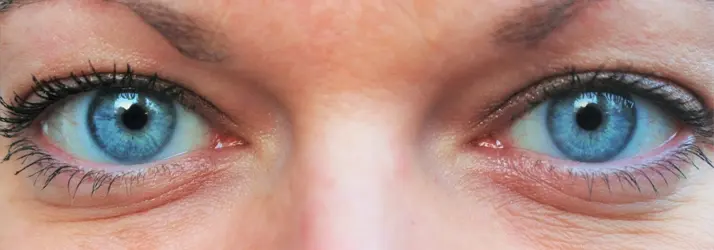Expert Diagnosis and Treatment for Dry Eye Syndrome at Foley Vision Center, Amesbury, MA

Dry eye syndrome can cause your eyes to feel irritated, tired, or watery, affecting both comfort and vision. At Foley Vision Center, we focus on identifying the root cause of your dry eyes and providing effective, personalized treatments to relieve symptoms and protect your long-term eye health.
What Causes Dry Eye Syndrome
Dry eye syndrome occurs when your eyes don’t produce enough tears or when tears evaporate too quickly. Tears are essential for keeping your eyes clean, smooth, and comfortable. When they don’t function properly, your eyes may feel dry, itchy, or fatigued.
Common causes include:
- Aging: Tear production naturally decreases with age.
- Medications: Allergy pills, antidepressants, and blood pressure medications can reduce tear flow.
- Medical conditions: Diabetes, thyroid disorders, and autoimmune diseases like Sjögren’s syndrome.
- Environment: Wind, smoke, air conditioning, and prolonged screen use.
- Meibomian gland dysfunction: Blocked oil glands in the eyelids cause tears to evaporate too quickly.
At Foley Vision Center, we evaluate all possible causes before creating a treatment plan. Understanding the “why” behind your dry eyes is the first step toward lasting relief.
Recognizing the Common Symptoms of Dry Eye
Dry eye feels different for everyone. Some patients describe a gritty or sandy sensation, while others notice excessive tearing or blurred vision.
Common symptoms include:
- Burning or stinging sensations
- Itchiness or constant irritation
- Blurry or fluctuating vision
- Excessive tearing (reflex tears)
- Sensitivity to light or glare
- Redness or a feeling of “something in the eye”
It may seem confusing when eyes feel both dry and watery. This happens because your eyes produce extra tears in response to irritation, but those tears don’t stay long enough to provide moisture.
Advanced Technology for Accurate Diagnosis
Every case of dry eye is unique. That’s why we use advanced diagnostic tools to pinpoint the exact cause:
- Meibomian gland imaging: Evaluates the health and function of the oil glands.
- Tear film testing: Measures how long tears remain on the eye surface.
- Osmolarity testing: Detects inflammation by measuring salt concentration in tears.
These tests provide a detailed picture of your eye health, enabling us to design a personalized treatment plan tailored to your specific needs.
Personalized Treatment Options
There’s no one-size-fits-all solution for dry eye. At Foley Vision Center, we offer a wide range of treatments to relieve symptoms and address the underlying cause:
- Prescription eye drops: Stimulate natural tear production or reduce inflammation.
- Punctal plugs: Tiny devices inserted into the tear ducts to keep tears from draining too quickly.
- Light-based therapies (IPL or LLLT): Improve oil gland function and reduce inflammation.
- Warm compresses & lid hygiene: Help unclog oil glands and improve tear stability.
- Oral medications or mild antibiotics: Can Help Reduce eyelid inflammation.
- Amniotic membranes: Promote healing of damaged eye tissue in severe cases.
Our goal is not just symptom relief, but long-term improvement in eye comfort and health.
Lifestyle & Environmental Tips for Dry Eye Relief
Your daily habits can have a significant effect on your eyes. Even simple things, such as the air around you or the duration of screen time, can exacerbate dry eye symptoms.
Try these easy changes to protect your eyes:
- Blink often during screen use to refresh your tear film.
- Use a humidifier to add moisture to indoor air.
- Stay hydrated by drinking plenty of water.
- Eat omega-3-rich foods, such as salmon, walnuts, or flaxseeds.
- Wear wraparound sunglasses outdoors to shield your eyes from the wind.
- Avoid smoke, fans, and direct air vents.
Small adjustments in your home or workspace can significantly reduce irritation and improve comfort.
When to Seek Professional Care
Occasional dryness is common, but chronic dry eye should not be ignored. Left untreated, it can lead to infections, corneal damage, or changes in vision.
Schedule an exam if you notice these symptoms:
- Persistent irritation or redness
- Blurry vision that doesn’t improve with blinking
- Excessive tearing without relief
- Symptoms lasting more than a few days
At Foley Vision Center, we use gentle, detailed tests to evaluate tear quality and eye surface health. Early treatment prevents complications and restores comfort.
Meet Dr. Matthew D. Foley, O.D.
Dr. Matthew Foley, O.D., founder and lead optometrist at Foley Vision Center, has been caring for patients across Massachusetts and New Hampshire for over 20 years. A graduate with honors from the New England College of Optometry in Boston, he has a special focus on advanced treatments for dry eye disease.
Dr. Foley combines clinical expertise, modern technology, and compassionate care to deliver the best outcomes for every patient.
Payment and Insurance
We accept most major insurance plans and flexible payment options, including:
- AARP
- Aetna
- AllWays Health Partners
- Anthem
- Blue Cross Blue Shield
- Cigna
- EyeMed
- Fallon Health
- Harvard Pilgrim Health Care
- Health Plans
- Humana
- Humana Military
- Mass General Brigham
- Medicare
- Spectera
- Tufts Health Plans
- UniCare
- United Healthcare
- VSP Vision Care
- Wellpoint
Our staff will review your benefits and address any questions you may have. Call us to confirm your coverage.
Contact Information:
Foley Vision Center
100 Macy St STE K
Amesbury, MA 01913
(978) 792-4400
OFFICE HOURS
Monday
Closed
Tuesday
9:00am - 6:00pm
Wednesday
9:00am - 6:00pm
Thursday
9:00am - 6:00pm
Friday
9:00am - 6:00pm
Saturday & Sunday
Closed
Foley Vision Center
100 Macy St STE K
Amesbury, MA 01913
P: (978) 792-4400
F: (978) 378-3385



